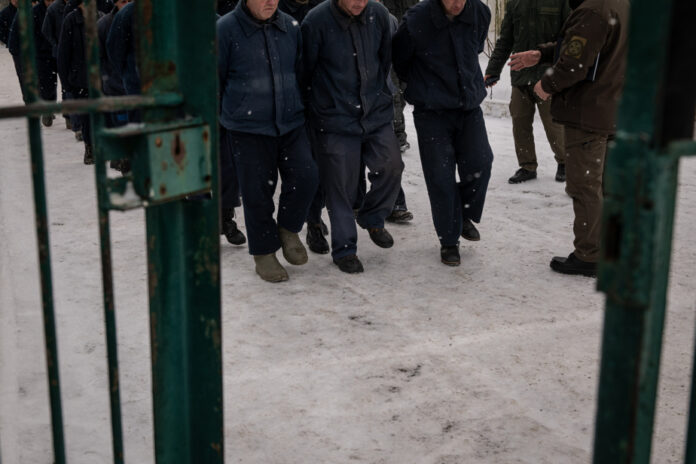In Russian prisons, they say they were deprived of effective HIV treatment. On the battlefield in Ukraine, they were offered hope by being promised antiviral drugs if they agreed to fight. A recruitment argument that has worked for many Russian prisoners.
Ukrainian authorities estimate that about 20 percent of recruits to Russian prisoner units are HIV-positive, based on infection rates of captured soldiers. Serving at the front seemed less risky than staying in prison, inmates said in interviews with The New York Times.
“The conditions were very harsh in Russian prisons,” said Timur, 37, an HIV-positive Russian soldier interviewed at a detention facility in the central Ukrainian city of Dnipro, and identified only by his first name. fearing reprisals if he returned to Russia in a prisoner exchange.
After he was sentenced to 10 years in prison for drug trafficking, doctors at the Russian prison replaced the antiviral drugs he was taking to fight HIV with others they feared would not be effective, explained Timur.
“I understood that I would have a quick death or a slow death,” he said of the choice between poor HIV treatment in prison and participation in assaults in the war waged by Russia in Ukraine. “I chose a quick death. »
Timur had no military experience and received two weeks of training before being sent to the front, he said. He received a Kalashnikov rifle, 120 bullets, an armored vest and a helmet for the assault.
Soldiers from his section, he said, were sent on a risky assault, with waves of soldiers with little chance of surviving being sent into battle on the outskirts of the eastern town of Bakhmout. Most were killed on their first day of combat. Timur has been captured.
Units of former prisoners formed the bulk of the force in the Russian attack on Bakhmut, one of the bloodiest and longest battles of the war. Starting last summer, inmates were promised pardons to go into battle.
People with HIV or hepatitis C were forced to publicly display their status.
When captured by Ukrainian soldiers, many of them wore red or white rubber bracelets, or both, indicating that they had one or other of these illnesses, both of which are very prevalent in the Russian prison system.
Antiviral drugs can treat HIV indefinitely and suppress the virus to the point that the individual is no longer contagious. Ukraine allows people with HIV to serve in combat roles with the approval of their commanders. The United States does not allow HIV-positive people to enlist, but allows infected soldiers to continue serving while receiving treatment.
“If a person is on treatment and continues with it, the virus can be undetectable and they can serve, work and not be dangerous to those around them,” said Dr. Iryna Dizha, medical advisor to 100% Life, a group of defending the rights of HIV-positive people in Ukraine.
Wristbands pose a risk to those who wear them. They are meant to protect other soldiers from infection if the wearer suffers a bloody wound on the battlefield, POWs explained. The reluctance of other soldiers or medics to be exposed to the blood, however, could delay first aid.
Another HIV-positive prisoner of war who fought in the Wagner Group, Yevgeny, said he had been shot and wounded a month before his capture by Ukrainian forces, according to an interrogation filmed by the Ukrainian internal intelligence agency which has been reviewed by The Times. He received timely medical help despite wearing a red wristband, but was treated at a hospital where he said doctors paid no attention to infecting other patients.
“There were no special measures for people infected with HIV,” he said. We were all treated together, those who were healthy and those who weren’t. »
In the chaos of battle, bracelets are of little use, said Vadim, 31, who was convicted of theft and served in Wagner before being captured in a bunker.
After the Ukrainian soldiers threw several grenades into the bunker, the Russian soldiers, two of whom were HIV-positive, took refuge in a corner. Three of the ten soldiers in the bunker were killed and most of the others were injured, Vadim said. He came out spattered with blood. “I was always afraid of this disease,” he said in an interview at a Ukrainian detention center. After the exposure, he was declared negative.
Ukraine’s military intelligence agency said last fall that some captured soldiers had HIV and hepatitis C. The national intelligence agency made available videos of Wagner’s POW interrogations describing HIV infection and showing red wristbands. Ukrainian authorities provide antiviral drugs to HIV-positive POWs.
HIV, hepatitis C, and tuberculosis, including drug-resistant strains, are prevalent in Russian prisons and penal colonies. According to Olga Romanova, director of Russia Behind Bars, about 10% of the Russian prison population is HIV positive. About a third of the total prison population suffers from at least one of these three infections.
In interviews, HIV-positive POWs said they were only asked to do pull-ups in front of a recruiter to prove they were fit to serve.


















